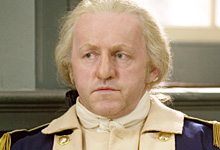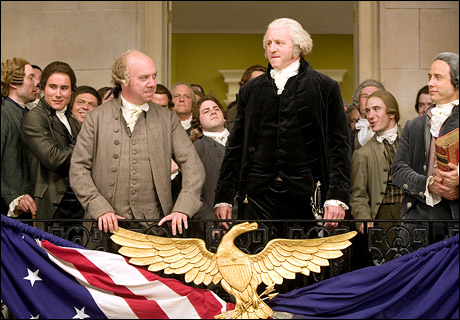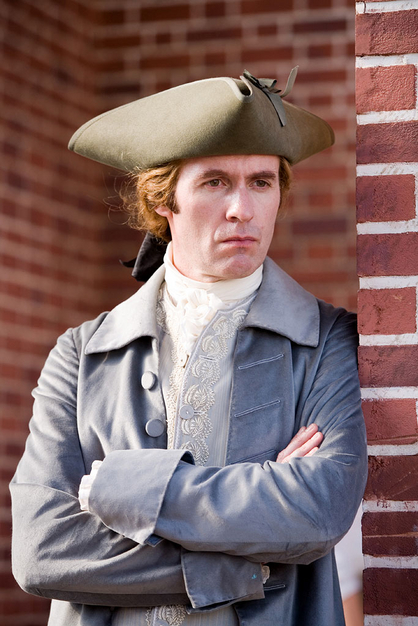The 60th annual Emmys nominees are announced, with plenty of justifiable love for John Adams (23 nods) and Mad Men (16). But, really, The Wire was overlooked again? No Mary McDonnell for Galactica? 2 and a Half Frickin’ Men(?!) over Flight of the Conchords for Best Comedy? I just can’t take these media monkeys or their plastic pantomime at all seriously anymore.
Category: John Adams
The Age of Federalism.
 To give credit where it’s due, tonight’s installment of John Adams went in exactly the direction I’d hoped, spending much more time on the political and less on the personal than previous episodes. We had Hamilton and Jefferson fighting over Federalist fiscal policy, Jefferson and the Adamses debating revolution and the health of France, Citizen Genêt, the Jay treaty, the consternation of Washington over the Republican-Federalist divide, and the first transfer of presidential authority, all of which I greatly enjoyed.
To give credit where it’s due, tonight’s installment of John Adams went in exactly the direction I’d hoped, spending much more time on the political and less on the personal than previous episodes. We had Hamilton and Jefferson fighting over Federalist fiscal policy, Jefferson and the Adamses debating revolution and the health of France, Citizen Genêt, the Jay treaty, the consternation of Washington over the Republican-Federalist divide, and the first transfer of presidential authority, all of which I greatly enjoyed.
I have only two minor quibbles: Some mention of the Whiskey Rebellion would’ve been grand (and could’ve been used to further dramatize Adams’ fear of the Mob, as soon to be represented in the Alien and Sedition Acts.) And, more importantly, the forgotten Founder in the series thus far has been James Madison, who — unless he’s been one of the backgrounders — has yet to appear. Even the good Doctor, Benjamin Rush, has had more screen time (although that’s probably due to his reconciliatory role in Episode 7.) Madison was in the House while Adams presided over the Senate, so shoehorning him in might’ve been unwieldy. Still, I’d have been content to have seen even a tiny nod to the writer of the Constitution — Instead of screen time, they could’ve just “cast big” a la Rufus Sewell for Hamilton, signalling Madison’s importance with a decent-sized cameo. (Now that I think about it, they should’ve done the same with Tom Paine earlier on.)
But, like I said (and my fondness for Franklin’s Parisian shenanigans notwithstanding), this was probably my favorite episode since part 2, on the Continental Congress. Heck, I even made my peace with Morse’s putty nose tonight. “I am fairly out and you are fairly in! See which of us will be the happiest!””
Birth of a Nation.

“‘He United the States of America’ is the miniseries’ motto, giving credit to Adams for everything. Franklin (Tom Wilkinson) is a rascal; Washington (David Morse) is a sapskull. Jefferson (Stephen Dillane) is distracted and, finally, deluded. And poor Thomas Paine seems never to have been born…“John Adams” is animated as much by Adams’s many private resentments as by the birth of the United States. It is history, with a grudge.” Speaking of Jill Lepore, her review of HBO’s John Adams appeared in The New Yorker a month or so ago. Now that we’re four weeks in, I’ll say that John Adams has worked as a decently acceptable Sunday night methadone for early Wire withdrawal. I particularly enjoy Stephen Dillane’s Jefferson, and (like many Americans of the early national period, I’d presume) would rather spend more time with him than with Giamatti’s Adams. Tom Wilkinson’s Ben Franklin is also worth relishing, but he’s somewhat hamstrung by the fact that virtually every other line he gets is one of Franklin’s famous epigrams. (The jury’s still out on David Morse and his putty nose — I’ll reserve judgment until after Washington’s presidency next week.)
My biggest problem with the show thus far, and this reflects my own historical biases more than anything else, is the sheer amount of time spent on John and Abigail’s relationship and family trials. This is not to say I’m totally averse to the social history: The smallpox inoculation, for example, was a intriguing addition to Episode 2. But, more often than not, I’d rather see much more birthing of the United States and much less of the domestic drama. Tonight’s episode, for example, spent more time on the respective travails of the Adams children than it did on the writing of the Constitution. Now, granted, this is partly because John Adams had very little to do with said writing (although you’d get no sense here that he was nevertheless defending it from afar.) Still, Adams and Jefferson discussed our founding charter for only one brief scene, thus shoehorning Jefferson’s thoughts on generational revolution, Franklin’s “republic, if you can keep it” riposte, Jefferson as “the American Sphinx,” the brewing of the Adams-Jefferson conflict, and the venerable undergraduate essay question, “Was the Constitution a continuation or repudiation of the American Revolution?,” all into five or so minutes. As a political history aficionado, I eat this stuff up like catnip. But then there’s at least 30-40 minutes devoted to John and Abigail doing variations on their Saltpeter-Pins schtick, and/or Sarah Polley and the rest of the Adams kids all grown up, courting and drinking. (Gasp!)
Now I understand McCullough’s book is above all else a biography, and some of this is par for the course. But — call me old-school, top-down, whatever — I’m really hoping the final three episodes, and particularly the next two on the “Age of Federalism,” spend significantly more time concentrating on the affairs of the early republic, and both John and Abigail’s important role in them, than on the domestic bliss and family squabbles of the Adamses themselves.
The Duke of Braintree.
HBO’s forthcoming mini-series of David McCullough’s John Adams looks to be in the can, and you can now watch the teaser (with a rather breathless endorsement by the author) at the official site. (It begins airing March 16, presumably after the close of The Wire.) The cast includes Paul Giamatti (John Adams), Laura Linney (Abigail Adams), Danny Huston (Sam Adams), Sarah Polley (Nabby Adams), Rufus Sewell (Hamilton), Tom Wilkinson (Franklin), Stephen Dillane (Jefferson), David Morse (Washington), and Bad Putty Nose (Washington’s Nose).

